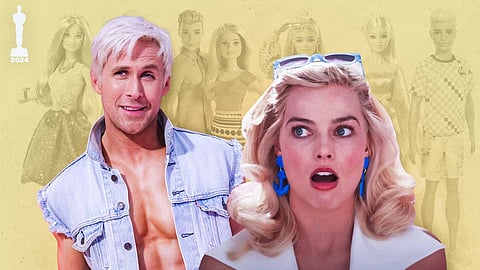
- Reviews
- Power List 2024
- Cannes 2024
- In-Depth Stories
- Web Stories
- News
- FC Lists
- Interviews
- Features
- FC SpecialsFC Specials

Traditionally, the nominees for Oscar’s Best Adapted Screenplay have had the formidable task of translating pages to screen. For Greta Gerwig and Noah Baumbach, there was no such thing. In fact, one could say their screenplay is the urtext — because what they had to do in Barbie (2023) is turn the legend of a bestselling toy into a story with a beginning, middle and end.
The origin story for the queen of the 2023 box office lies in American toy manufacturing company Mattel wanting to leverage the brand through commercial cinema. Over the decades, the Barbie doll has had a complicated relationship with society at large. On one hand, it was popular with kids and for those outside America, it projected a notion of Americans as shiny, modern and blonde. However, the potential for toxicity lay in much more than the plastic with which it was made. From encouraging consumerism to promoting impossible beauty ideals, the complaints against Barbie were many. However, the reason for Mattel wanting a film about the toy is more likely to be an ambition to widen its market and remain part of the cultural zeitgeist (because that’s what ensures steady sales and profits).
Enter producer Margot Robbie and director Greta Gerwig, two women who are remarkably like Barbie come to life with their statuesque figures, blond hair and shining eyes. Unlike Barbie, Robbie and Gerwig have made a career out of exploring messy women and platforming feminism through the stories they bring to the screen. The film that Gerwig would make for Mattel is far from perfect, but it is remarkable for the tightrope it walks between commerce, consumerism, idealism and entertainment. Given Barbie was the highest-grossing film of 2023 and is the 14th highest-grossing film of all time, the story that Gerwig and Noah Baumbach created for Barbie clearly hit the sweet spot. No doubt it helps to have the heft of a multinational company with established chains of international distribution behind a film, but it would be naive to assume that Barbie could be as successful without a story that resonated with audiences.
The difficulty of making up a story for Barbie is that there’s no one existing legend for the doll. Rather, she’s been part of generations of children’s imaginary worlds, fitting herself into the stories they dreamt up to entertain and comfort themselves. One of the smarter details in Gerwig and Baumbach’s screenplay is that it overturns the idea that Barbie lacks diversity by establishing Barbieland as a place with many different Barbies (and Kens), including one who is perennially pregnant and another who is known as Weird Barbie. Robbie plays Stereotypical Barbie whose plastic life suffers a meltdown when she suddenly has thoughts of death. It turns out that each Barbie in Barbieland has a link to someone in our world. Stereotypical Barbie must find who is playing with her — literally and metaphorically — in order to stop these dark thoughts in her head. So, with Ken (Ryan Gosling) as a stowaway, Barbie leaves Barbieland and comes to the ‘real’ world, where she discovers, among other things, old women and patriarchy.
There’s a lot about Barbie that is an absolute delight to watch on big screen because Gerwig and Baumbach sneak in odes to Hollywood classics, like 2001: Space Odyssey (1968) and The Wizard of Oz (1939), as well as details from Mattel’s history. The film has Helen Mirren doing a voiceover, which is an absolute joy to hear. Ruth Handler, who co-founded Mattel Toys and created Barbie as a doll for girls, has a cameo in the film, which Robbie has said is one of her favourite moments in Barbie. (It’s a little horrifying to imagine Handler trapped in a limbo, in the Mattel headquarters, instead of, you know, being able to get out and live her life outside of work, but maybe that’s just us being killjoys.) Ironically for a film that is supposed to be all about women taking charge of their narrative, some the most memorable scenes of Barbie feature Ken, a role that confirmed Ryan Gosling’s status as The Internet Boyfriend. Among the disappointing details in Barbie is the preachy monologue that America Ferrera delivers, which sounds like a compilation of lines taken from videos tagged under “feminism” on Tik Tok and Instagram. At one point, Barbie effectively disenfranchises the Kens, conning them so that they’re not able to vote, which is a disturbing fictional tangent to put on big screen at a time when America is grappling with voters from marginalised communities not being allowed to exercise their votes (by virtue of Barbieland being a matriarchy, Kens are effectively oppressed). There’s also the minor detail that at the end, Stereotypical Barbie’s first act as a “real” woman is to go to a gynaecologist, as though the biology is what defines womanhood.
Still, for all its awkward bits, Barbie is a thought provoking film because of its screenplay, which didn’t shy away from either femininity or feminism. Conventionally, these subjects are considered a death knell for profits, but Barbie went on to make a stupendous amount of money at the box office. Whatever it may lack in terms of narrative sophistication, it arguably makes up for with the film’s ability to not just draw audiences to the cinema, but also school them on feminism while entertaining them.